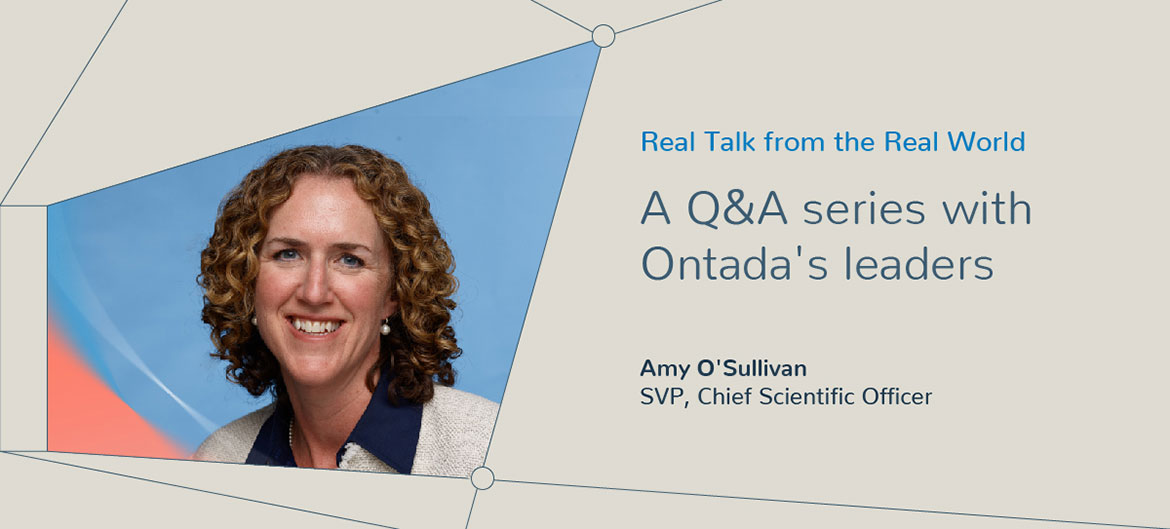
Q: Why are you passionate about real-world data and evidence?
A: Real world evidence is and always has been pivotal to guide decision making in healthcare. Although the terms real-world data (RWD) and real-world evidence (RWE) have gained momentum in the healthcare vernacular over the past 10 years, RWD and RWE have been used for over 100 years to inform our decisions in healthcare.
While randomized controlled trials are needed to provide proof that an intervention works as intended and is safe in the target population, once that is established, what really matters is how the treatment performs in the real world. This gives us insight into a diverse population that may or may not take the treatment the way it was prescribed or intended.
RWE can be used to assess long term safety and effectiveness of a product, impact on quality of life and economic value. To that end, RWE is of interest to, and used by, all of the stakeholders in the ecosystem to inform decision making: healthcare professionals, regulatory authorities, patients, caregivers and families, payers and institutions.
A recent example of how RWE has informed an important public health problem was in fighting COVID-19 with vaccines. Without long-term RWE, we would not have known that we need booster shots to continue to protect us against waning immunity over time.
What is so exciting about the acceleration of technology, data platforms, and advanced analytic methods is that the power of RWE is just beginning to be unleashed. The tools we now have at our disposal will help us get even more precise insights regarding the right treatment for the right patient at the right time.
Q: How do you define quality real-world data?
A: The holy grail of quality real-world data would be that they are complete, consistent, accurate. We have to be confident that the data were collected, entered, processed, and managed according to very clear, detailed, and robust and reproducible processes.
The truth is that no set of RWD is perfect. One of the biggest challenges for us as researchers is that oftentimes the RWD we wish to analyze to gain insights were not collected for research purposes, which means there will be inherent limitations in the conclusions we can draw.
That being said, real-world studies, such as registries, are being conducted with increasing frequency, and these give us more flexibility to design the dataset to include variables that are important to the research questions at hand (and that may not be available from administrative claims data or EHRs).
Q: How do you see the real-world evidence landscape evolving in the coming years?
A: The most obvious evolution to me is increased use of real-world evidence in regulatory decision making. We have seen – through the release of recent draft guidances on RWD and RWE, registries, and use of administrative claims and electronic health record (EHR) data from the FDA – that the Agency recognizes the importance and need for these data (in addition to interventional trials).
We still have a ways to go here, but with more complete and accessible datasets, along with the evolution of more innovative methodologic approaches to handle some of the challenges we have traditionally had analyzing RWD, I think RWE will play a large role in regulatory decision making in the near future.
Q: How does real-world evidence help us to understand and address health disparities and unmet needs?
A: Real-world evidence is essential to helping us understand inequities in the healthcare ecosystem. Using RWD, we can better understand the social determinants of health (SDOH) impacting care, such as who is receiving recommended treatment for a given condition and what the outcomes are for different subgroups. Treatment patterns, outcomes, quality of life, and costs can all be assessed and compared across groups using RWD, providing insight into where the health disparities are and allowing us to start to address them in practice.
Q: What are some of the most pressing questions in cancer research that you’d like to explore?
A: I am so excited to dig into the oncology data and assets at Ontada, as I believe we can tackle some really important and meaningful questions. Top of mind for me is to start digging into genomic data, as the field of oncology is rapidly moving towards precision medicine to enable specific treatments to be provided depending on individual clinical and disease characteristics.
In addition, since oncology is so fast-moving, there are new treatments with new mechanisms being approved all the time, so another area of interest of mine is to explore the long-term outcomes, including quality of life consequences, of these new treatments.
My beloved grandmother died of lung cancer over 25 years ago, when the only treatment available to her was chemotherapy and radiation. She opted to stop chemotherapy on her own due to the effects it had on her quality of life in last few months she had left. It is so encouraging that we have many more options for patients these days, but it is also important to understand not only the efficacy in terms of tumor shrinkage and progression-free survival, but also quality of life.
Q: Why did you choose to join Ontada?
A: I was so energized to learn of Ontada’s mission to deliver precise, evidence-based insights to providers at the point of care and to accelerate drug development with innovative data solutions, bringing together one community aimed to transform cancer care. Ontada is uniquely positioned due to its relationship with The US Oncology Network, which facilitates a deep connection with providers on the front lines.
I wanted to make a difference for patients and the healthcare ecosystem, and I believe being at Ontada helps me do just that.



